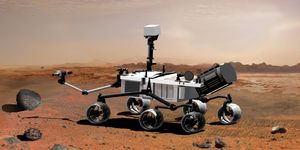Finding the Missing Pieces of Autism
Autism affects 1 in 68 children. That’s a number that’s talked about a lot in the media and in the scientific community as well. With more children being diagnosed, more families are in need of support services, educational tools and inclusion strategies. That help might be coming in the form of a database that will be open source.
The largest advocacy group for autism research and information, Autism Speaks, has launched a web-based portal for their collection of genetic information on autism. The database is called MSSNG, and the acronym doesn’t stand for anything other than a nod to the great deal of missing information (as seen in the puzzle piece logo of Autism Speaks) about autism. It’s a collection of genomes that have been acquired from people with autism. The goal is to collect 10,000 completely sequenced genomes from the Autism Genetic Research Exchange (AGRE) and other respected sources. The database is managed on the Google Cloud Platform, as well as Google Genomics and is available to qualified scientists to access and use the information to assist families affected by autism and to further research into the spectrum of disorders.
Begun in in December 2014, the MSSNG project’s goal is to provide a resource for the study of autism and to make this resource available to research professionals. While not fully complete, the first phase is now available. It’s a groundbreaking collaboration of several different leaders in the field of autism research. David Glazer from Google, Rob Ring from Autism Speaks and Stephen Scherer of SickKids Hospital and the University of Toronto are the founders of the project.
The group hopes that by early 2016 the database will be complete at 10,000 sequenced genomes. With that much information in one place the aim is for researchers to have access to the database and hopefully use it to answer some of the many questions of this disorder. As it stands now there is no known cause for autism and no cure.Currently the database contains 3,540 genomes and of those 1,715 are available through the portal for research purposes.
In an interview with PBS News Hour, David Glazer from Google said, “ What we realized a couple years ago is that the world of biology has started to generate a lot more information than they historically had tools to work with. And that’s what we at Google are really good at, is taking large amounts of information and finding the value in that information. What we’re doing with the MSSNG project is saying, you guys are generating and gathering, from all the volunteer families, this really valuable set of information. Let us help make that information as valuable as possible.”
Dr. Robert Ring, chief science officer at Autism Speaks said in a press release, “The development, open sharing and collaborative exploration of massive databases of genomic information, like those already available through MSSNG, will shape the future of autism research more than any other specific area of scientific investment.”
Check out the video below to learn more about the MSSNG Project and how the collection of autism genomes could advance the search for a cure.









